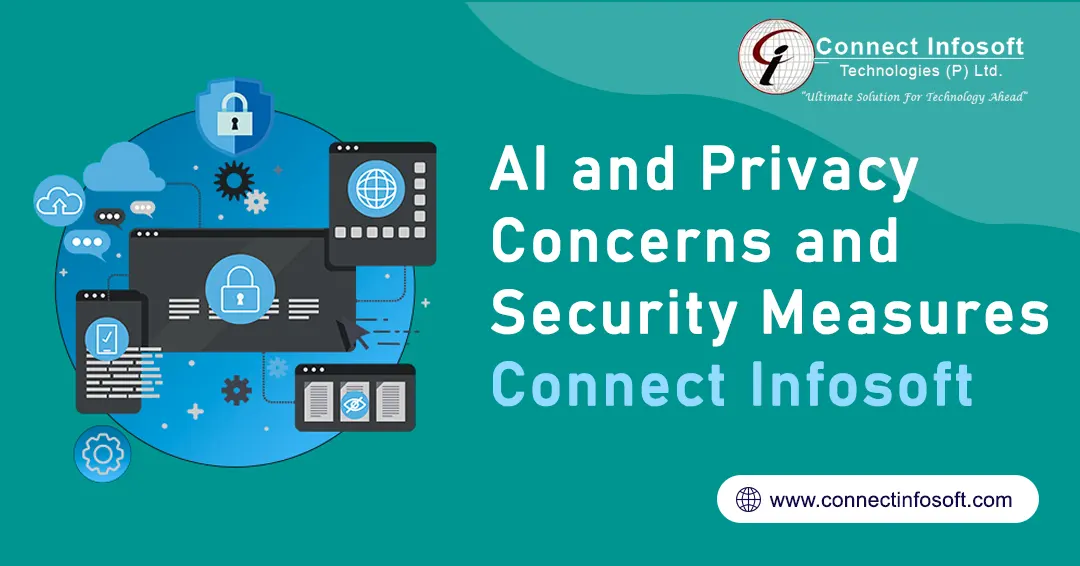Article -> Article Details
| Title | AI and Privacy Concerns: Ensuring Security Measures in the Digital Age |
|---|---|
| Category | Computers --> Artificial Intelligence |
| Meta Keywords | AI and Privacy Concerns and Security Measures, Hire Machine Learning Developer, Machine Learning Development in India, Machine Learning Developer, Looking For Machine Learning Developer, Looking For Machine Learning Dev Team, Hire Machine Learning Developer |
| Owner | Sanjay Sahoo |
| Description | |
|
In today's
quickly changing digital landscape, artificial
intelligence (AI) has emerged as a revolutionary force, disrupting a
variety of businesses. From personalized recommendations to automated customer
service, AI has introduced unprecedented convenience and efficiency. However,
the rise of AI technologies also raises concerns about privacy and data
security. In this
blog, we will explore the intersection of AI and privacy concerns, as well as
the importance of implementing robust security measures to protect sensitive
information. The Intersection of AI and Privacy: AI relies
heavily on data, and the collection, analysis, and utilization of vast amounts
of personal information raise significant privacy concerns. Here are a
few key areas where AI intersects with privacy: 1. Data Collection and Usage: AI systems require access to
substantial amounts of data to learn and make accurate predictions. This data
often includes personal details, browsing history, preferences, and more.
Concerns arise when individuals are unaware of or have no control over the data
collected and how it is used. 2. Surveillance and Tracking: AI-powered surveillance systems,
facial recognition technologies, and behavioral tracking raise serious privacy
concerns. Unauthorized access to personal information or the potential for
misuse can infringe upon individuals' privacy rights. 3. Algorithmic Bias and
Discrimination: AI
algorithms are designed to make decisions based on patterns in data. However,
if the training data is biased or contains discriminatory patterns, AI systems
can perpetuate existing biases, leading to unfair outcomes in areas such as
hiring, lending, and law enforcement. 4. Data Breaches and Security: With the increasing reliance on AI,
the risk of data breaches and security threats also grows. Malicious actors may
exploit vulnerabilities in AI systems to gain unauthorized access to sensitive
information, potentially leading to identity theft, financial loss, or other
harmful consequences. Ensuring Security Measures: To address
privacy concerns associated with AI, it is crucial to implement robust security
measures. Here are some key steps organizations can take: 1. Data Encryption: Encrypting sensitive data ensures
that even if unauthorized access occurs, the information remains unreadable and
unusable. Strong encryption protocols, secure key management practices, and
regular audits of encryption systems are essential. 2. Consent and Transparency: Organizations must obtain informed
consent from individuals before collecting and using their data. Clear and
concise privacy policies, along with transparent communication about data
collection practices, build trust and empower individuals to make informed
decisions. 3. Anonymization and
De-identification:
To protect privacy, organizations can anonymize or de-identify data by removing
personally identifiable information. This enables data analysis while
minimizing the risk of re-identification. 4. Privacy by Design: Adopting a privacy-first approach in
AI system development is crucial. Privacy considerations should be integrated
from the initial design stage, ensuring that privacy controls and protections
are built into the system's architecture and functionality. 5. Regular Security Audits: Conducting regular security audits
and vulnerability assessments help identify potential weaknesses in AI systems.
Prompt patching of security vulnerabilities and staying updated with the latest
security practices are essential to mitigate risks. 6. Ethical AI Development: Organizations should foster ethical
AI practices, promoting fairness, transparency, and accountability. This
includes addressing algorithmic bias, regularly auditing AI models for
fairness, and involving diverse teams in the development process. 7. Compliance with Regulations: Adhering to applicable data
protection regulations, such as the General Data Protection Regulation (GDPR)
or the California Consumer Privacy Act (CCPA), ensures that privacy rights are
preserved and respected. Conclusion: As AI
technology continues to advance, addressing privacy concerns and
implementing robust security measures is of paramount importance. Organizations
must prioritize data protection, transparency, and ethical AI practices to
ensure that individual's privacy rights are safeguarded. By adopting
privacy-centric approaches and complying with regulations, we can strike a
balance between reaping the benefits of AI and protecting personal privacy in
the digital age. Tags: AI and Privacy Concerns and Security Measures, Hire Machine Learning Developer, Machine Learning Development in India, Machine Learning Developer, Looking For Machine Learning Developer, Looking For Machine Learning Dev Team, Hire Machine Learning Developer, Data Analytics Company, Python Development Company, Python Developers Team | |

